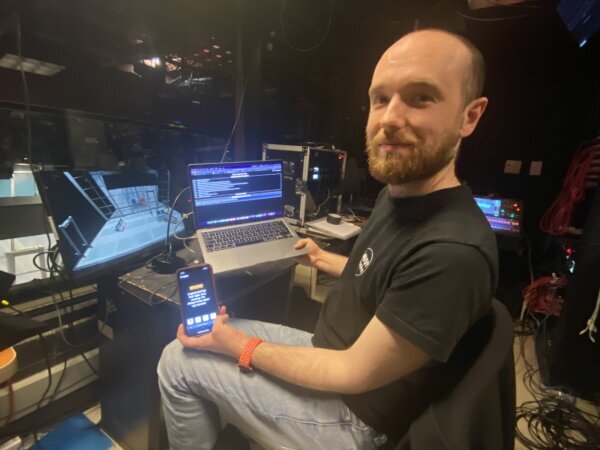This video is no longer available.
Live theater can be difficult to enjoy for those who have difficulty hearing.
Bigger theaters team up with a third party to provide captioning either through an app you have to download or a tablet provided by the theater. Sometimes playhouses will also have giant screens with captioning, too.
Smaller theaters don’t always have the resources to make that happen, though.
Timothy Kelly, a University of Maryland student working on his master’s degree saw that firsthand while working at a children’s theater in New Hampshire. Grandparents attending the shows didn’t always fare well.
But now he’s come up with a program called “Capstr” that aims to remove some of the barriers for smaller venues.
“People are really trying to make stuff accessible. The thing that we’re trying to do with Capstr is to make it so that you don’t have to download anything,” said Kelly. “It is a single QR code that gets you to a web browser. And as long as you have an internet connection, you’re done.”
The captioning comes across your phone via the web browser. Theaters can also color-code the words so the audience knows which character said something. It’s also possible to differentiate the text between someone who is speaking something versus singing a line. It can also be translated into other languages.
A play running at the school’s Clarice Smith Performing Arts Center has been translated from Russian into English, but audience members who struggle to hear can read the captioning in either language.
“We want there to be very little excuse for theaters to not provide captioning services for their audience members, especially when there’s only a couple of shows running that are captioned.”
Kelly described limited captioning services available only on certain days and other hurdles as “little barriers to entry that stack up for people.”

Any venue running Capstr still needs someone to follow the script and essentially press a button that pushes the script onto the website, which people are looking at on their phones. But it’s as simple as just pressing a button on a laptop.
He admits it’s not a perfect solution for guests — looking back and forth from phones to the stage isn’t ideal for anyone — but Kelly said his work with deaf and hard of hearing audiences in the past proved to him that they appreciate the effort to be more inclusive.
And in keeping with that theme, he’s working to make the code for the captioning program free to any theater that wants it.
“We see no reason that a future can’t exist where every show has captions available for every performance,” he said.
Get breaking news and daily headlines delivered to your email inbox by signing up here.
© 2024 WTOP. All Rights Reserved. This website is not intended for users located within the European Economic Area.






